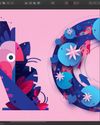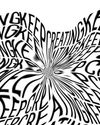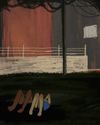
Servicing a diverse range of clients across the globe, from arts and culture to waste management, its output is defined by a bold, conceptual simplicity that cuts through to the core of powerful ideas. We caught up with Tim and Amanda to discover where they’ve been, where they’re going, and how they’ve managed to stay sane throughout it all.
What’s the story behind Seachange?
Amanda Gaskin: Tim and I met 13 years ago at a small design agency in Auckland. Soon after that, we moved to London, where we lived for 10 years. Tim had always wanted to start his own studio, but I don’t think either of us thought we’d start one together. It happened naturally after we had our first child, and realised that working full-time for other people wasn’t going to suit our lives any more. We moved back to New Zealand and it just happened organically. There was no big, “Let’s start an agency” moment, more of a, “Shit, we’re an agency now”.
In what ways has Seachange developed since then?
AG: We’re evolving all the time; there’s so much to learn. We’re constantly making mistakes on the business side of things, as both of us are designers through and through. We hired our first designer this year, and took on our own studio space, which is still a work in progress.
This story is from the May 2020 edition of Computer Arts - UK.
Start your 7-day Magzter GOLD free trial to access thousands of curated premium stories, and 9,000+ magazines and newspapers.
Already a subscriber ? Sign In
This story is from the May 2020 edition of Computer Arts - UK.
Start your 7-day Magzter GOLD free trial to access thousands of curated premium stories, and 9,000+ magazines and newspapers.
Already a subscriber? Sign In
Creative Space
Without’s creative director roly grant on the studio’s hand-crafted ethos
studio profile
A leading light in the branding industry, Wolff Olins wants to harness its scale to help change the world

network
THE CREATIVE COMMUNITY HAS COME TOGETHER LIKE NEVER BEFORE, TO HELP EACH OTHER GET THROUGH THE CORONAVIRUS PANDEMIC

project
ethos for 305 Fitness - Learn how the Montreal identity design studio rebranded one of America’s hottest fitness clubs

rebrand
WHAT’S THE EXPERT OPINION ON PENTAGRAM’S BRAND IDENTITY REFRESH OF THE GLOBAL TOY COMPANY FISHER-PRICE?
opinion
CRAIG BLACK HAS SOME ADVICE FOR SURVIVING THE CORONAVIRUS CRISIS AS AN INDEPENDENT CREATIVE

fresh eyes
DUNCAN BRAZZIL ON HOW THE UK INSPIRED HIS CAREER

artist insight
Cindy Kang on how photography informs her illustration work
ANIMATION NOW
LEADING PRODUCERS AND FILMMAKERS REFLECT ON EMERGING TRENDS AND SHARE THEIR PREDICTIONS FOR THE YEAR AHEAD
Project: Atoll by Studio Myerscough
Morag Myerscough reveals how she and Luke Morgan designed a vibrant biophilic installation in a central London office tower studiomyerscough.com